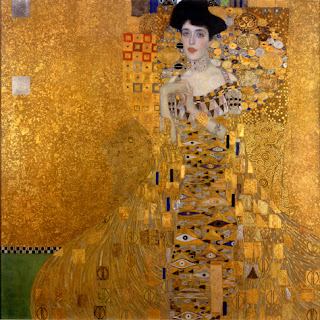 |
| Portrait of Adele Bloch-Bauer by Gustav Klimt, 1907 |
Reviewed by Ruth Hansford on Jan 24 2016
Star rating:
Highbrow and middlebrow mix, recreating the Viennese salon by candlelight
At first glance the Sam Wanamaker Playhouse is not an obvious venue for a concert celebrating Viennese culture. But in fact the candle-lit intimacy of the space worked extremely well for this re-imagining of the city’s 19th and 20th salons, presented by the City of London Sinfonia directed by clarinettist Michael Collins with soprano Dame Felicity Lott on Sunday 24 January 2016. As well as the frothy fare we automatically think of, these salons also hosted the serious: Schoenberg’s Society for Private Musical Performances was established in 1918 to give small-scale performances of challenging large-scale pieces. So we heard music by composers ranging from Bach and Schubert through Richard Strauss, Berg & Schoenberg to Lehar and Oscar Straus. And of course this mix of highbrow and middlebrow suits the ethos of the Globe perfectly too.
 |
| Dame Felicity Lott © Trevor Leighton |
Richard Strauss’ extravagant orchestration was arranged by David Matthews for the closing scene of Capriccio. Felicity Lott introduced the scene by reflecting on why Strauss had written such a seemingly trivial piece at such a time (in 1942), but pointing out that the relative roles of words and music is a big question. She summarised the plot so far (the whole opera!) with such economy and lightness of touch that we didn’t need to see the translation in the printed programme (which it was too dark to see anyway). Lott stood behind the orchestra, wisely using the back wall of the theatre to help with projection above the ensemble which, though a fraction of Strauss’ forces, was quite a size. She is totally in command of the role and the voice still soars as required. The diction is of course impeccable and she had us all believe we could speak fluent German. We were spellbound.
After the interval Berg’s Four Pieces for Clarinet scaled up by Colin Matthews for violin, cello and flute as well as the clarinet and piano was performed with precision and exuberance. In stark contrast came David Matthews’ arrangement for string quartet of ‘Im Dorfe’ (In the village) from Winterreise, the low rumblings of the cello against the soaring first violin – in Schubert’s song itself the dogs rattling their chains as the hero is desperate to get away from the sleeping village.
To finish, three Viennese operetta songs from Felicity Lott, introduced with the comment ‘There are some songs you couldn’t write any more’. A good ruse to remind us to enjoy these songs on their own terms rather than through our own contemporary eyes. Lehár’s ‘Komm zu mir zum Tee’ is the story of an office girl invited to tea and cakes by a gentleman; the tea has an interesting taste (…) and she leaves at 5 o’clock in the morning. The two Oscar Straus were performed more schmalzily than you could imagine: ‘Jede Frau hat irgendeine Sehnsucht’ (Every woman has some kind of longing) and ‘Warum soll eine Frau kein Verhältnis haben?’ (Why shouldn’t she be in a relationship?) Lott really knows how to work a room: gossiping with all of us, and the band, covering all the possible reasons why a woman might be having an affair, and with whom. Great fun, and what’s more we had it all again but performed completely differently for the encore.
Reviewed by Ruth Hansford
Michael Collins, Conductor/Clarinet
Dame Felicity Lott, Soprano
City of London Sinfonia: Alexandra Wood, Violin; Jane Carwardine, Violin; Rebecca Jones, Viola; Sophie Renshaw , Viola; Sue Dorey , Cello; Rebecca Knight, Cello; Ben Russell, Bass; Karen Jones, Flute; Philip Harmer, Oboe/ cor anglais; Katherine Spencer , Clarinet; Ursula Leveaux , Bassoon; Stephen Stirling, Horn; Nick Betts , Trumpet; Rachel Masters , Harp; Michael, McHale Piano.
Elsewhere on this blog:
- Musical & literary treats: Mark Padmore and Paul Lewis in Schubert, Schumann, Brahms & Wolf - concert review
- Improvisatory freedom: Alice Coote, Julius Drake in Schubert, Strauss, Elgar - concert review
- Invisible stars: Choral Scholars of University College Dublin - Cd review
- A new voice: Ascension from James Dunlop - CD review
- 1766 Retrospective: Ian Page & Classical Opera - concert review
- Harmonische freude: Austral Harmony - CD review
- Numinous sound: Time and its passing, Rodolfus Choir - CD review
- Russian Impressionism: Mussorgsky songs from Katherine Broderick & Sergey Rybin - CD review
- Elizabeth, Piatigorsky, Heifetz & rare repertoire: My encounter with cellist Raphael Wallfisch - interview
- Beyond the sorcerer's apprentice: Paul Dukas' music for the Prix de Rome from Palazzetto Bru Zane - CD review
- Dancing in the aisles: OAE in Monteverdi's other vespers at Kings Place - concert review
- Home











No comments:
Post a Comment